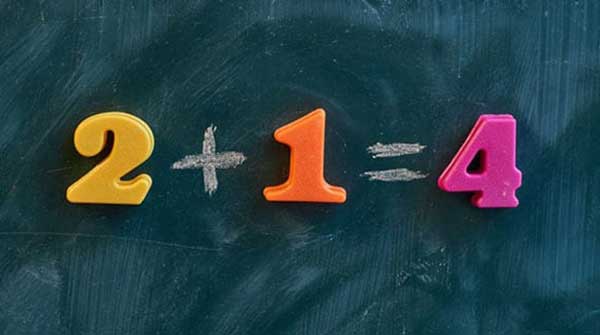 The defunct game show that asked Are You Smarter Than a Fifth Grader? may have predicted this problem.
The defunct game show that asked Are You Smarter Than a Fifth Grader? may have predicted this problem.
Reports out of teachers colleges suggest that the fifth grade teacher is struggling with the mathematics curriculum – just as their students are.
Many new Canadian elementary school teachers lack basic math skills involving multiplication, division and fractions. As a result, universities are now demanding math proficiency courses as part of their faculty of education curriculum.
Is it any wonder that right across Canada math scores among elementary school children continue to drop?
Years ago, much of what we learned about mathematics in elementary school was by rote. We memorized the multiplication table. Previous generations of students knew what BEDMAS (an acronym to help remember an order of operations in algebra basics) meant, and various other algorithms and formulas were committed to memory.
Yet some educators felt that learning math through memorization was not dynamic enough; it was too mundane for students. Remember how boring it was to work on a long division problem? Well, long division is not part of today’s curriculum.
To make math more interesting, the new curriculum relies on students “discovering” the subject. Children no longer learn that 2 multiplied by 2 equals 4. With discovery math, students are now expected to know why the answer is 4, and to explain it in writing.
Discovery math usually begins with a word or picture problem. Even if a child gets the answer wrong but can somewhat explain the process, they’ll earn partial marks. These partial marks allow students who have not learned the skill to pass the subject and to move on to the next level.
Yet by passing students who haven’t learned the fundamentals of math, discovery math ultimately sends numerically illiterate students on to high school, and beyond.
The problem is that if discovery math is put into practice, especially at a young age when children haven’t reached the developmental stage of abstract thinking, we eventually see greater instances of high school graduates who struggle with basic numeracy, such as the cashier who can’t make proper change.
In Quebec, educators resisted such experimental theory and continue to teach key principles in elementary school by rote. Today, Quebec students are bucking the trend in the rest of Canada. The Organization for Economic Co-operation and Development’s Programme for International Student Assessment gave Quebec’s school system A+ and A grades on student math skills. Quebec is the only province to achieve such standards.
In response to worrisome trends, some provinces in Western Canada are beginning to reintroduce the multiplication tables into the elementary school curriculum so students won’t be so dependent on calculators for basic transactions.
In Ontario, the government has announced $60 million more in funding towards additional math training for elementary school teachers.
While teachers who are weak at math are part of the problem, the biggest test may be not challenging the precepts of discovery math.
Children who get As in school usually succeed regardless. But today’s educators are doing a real disservice to students who generally earn Bs, Cs and Ds under the new discovery math system.
At one time, a student who did not do well on a test was told to study harder in order to succeed the next time. Today, struggling students receive partial marks, dangerously deceiving children into believing that they are competent enough to move on to the next academic level. It isn’t until years later – when we realize those students don’t know enough math to get by – that we see the magnitude of the problem.
Colleges, universities and employers are struggling to deal with a disturbing lack of skills among recent high school graduates.
We owe it to the next generation to learn from the outcomes of discovery math, and return to teaching methods that work.
Maddie Di Muccio is a former town councillor in Newmarket, Ont., and former columnist with the Toronto Sun.
Maddie is a Troy Media contributor. Why aren’t you?
The views, opinions and positions expressed by columnists and contributors are the author’s alone. They do not inherently or expressly reflect the views, opinions and/or positions of our publication.



Anna Stokke, co-founder of the WISE Math initiative (Western Initiative for Strength and Excellence in Mathematics) said it best when she was interviewed after her CD Howe Report on Canada’s Declining Math Scores was published: “You know what’s the worst kind of instruction? The kind of instruction that makes kids feel stupid. And that’s what a lot of that discovery stuff does”
Cognitive Science has determined that understanding and knowledge cannot occur without mastery of math facts, and those facts are best learned through straightforward methods and direct instruction. These are the same methods utilized in tutoring centres across the country, of which up to 50 per cent (in some communities) of our kids are now enrolled. To repeat, learning centres rely on the same successful methods that our provincial system chooses to ignore.
It’s monstrous, and devastating to those families, and to our frontline teachers, to perpetually sell them damaging, unproven strategies that are little more than opinion and experiments on our children. Math performance in Canada is failing (with one exception, Quebec), yet educationists prefer to spend time fiddling while Rome burns.
We know what works, and so do the professional mathematicians, knowledgeable teachers, and concerned parents. So in a time where every penny of education funding is necessary, why are we wasting precious energy and money on strategies that continue to fail our children?